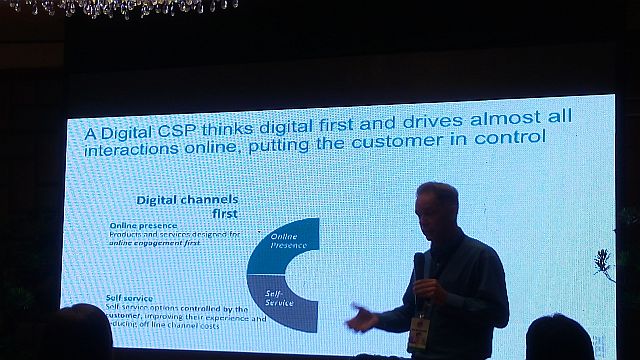
Rob van den Dam (CDN PHOTO/VICTOR ANTHONY A. SILVA).
Amid the rise of challengers within and outside the telecommunications industry, service providers were told to lower costs or find other revenue sources.
Rob van den Dam, global telecom industry leader for IBM, said majority of telco executives today are “terrified of outsiders making a land grab.”
“Across all industries, 54 percent said they expect competition from outside their industries. Examples of this would be Uber for transport and Airbnb for hospitality. Within the telecom industry, 76 percent believe the same,” he said in a workshop during the 12th Asian Carriers Conference at Shangri-La Mactan Resort & Spa on Wednesday.
With around 1,300 delegates from more than 60 countries this year, the annual ACC seeks to gather industry players to discuss the latest trends and challenges in providing communications services.
Van den Dam said executives recognize this threat because they have already been disrupted.
Facebook, Skype, and Whatsapp, among others, provide higher customer experience through personalized features compared to communications services providers’ more traditional voice and text services.
The industry leader said that what players can do is to lower their costs since even their core services aren’t actually that good in terms of providing customer experience.
Communications services provision (CSP) has become a complicated battleground, involving players ranging from traditional CSPs, cable providers that also offer broadband services, and digital giants providing over-the-top (OTT) content like Google.
Van den Dam said that the executives shared that they expect great competition from digital giants and “ankle biters” or startups that are very agile and can eat part of a company’s revenue.
Up to the first quarter of 2014, free mobile messaging platform Whatsapp had already erased $33 billion in SMS revenues from wireless operators.
Another imperative CSPs could follow is to look for alternative revenue sources.
But van den Dam noted that since voice and text services comprise a big margin of sales, companies would have to find sources that could give them double of what they earned from traditional sources.
Companies, he added, can take advantage of the Internet of Things (IoT), an era characterized by the interconnectivity of anything to everything including mobile devices, cars, and other necessities in life.
Adjacent markets can also be tapped by telcos to make up for revenue losses caused by the entry of digital players.
He also stressed, however, that the best way to compete in the evolving market is still to undergo digital transformation.
Trailblazing companies such as Apple, Amazon and Google embrace their customers’ love for digital to fundamentally change customer experience.
Van den Dam said digital CSPs brings all its interactions with customers online and puts the latter in control.
Digital self-service not only allows high customer experience, it also reduces line channel costs.
He said that 90 percent of transactions should be done online, with an option for customers to talk to organic employees for additional support.
Digital transformation may be terrifying for traditional telcos, but van den Dam said it is also urgent and necessary.